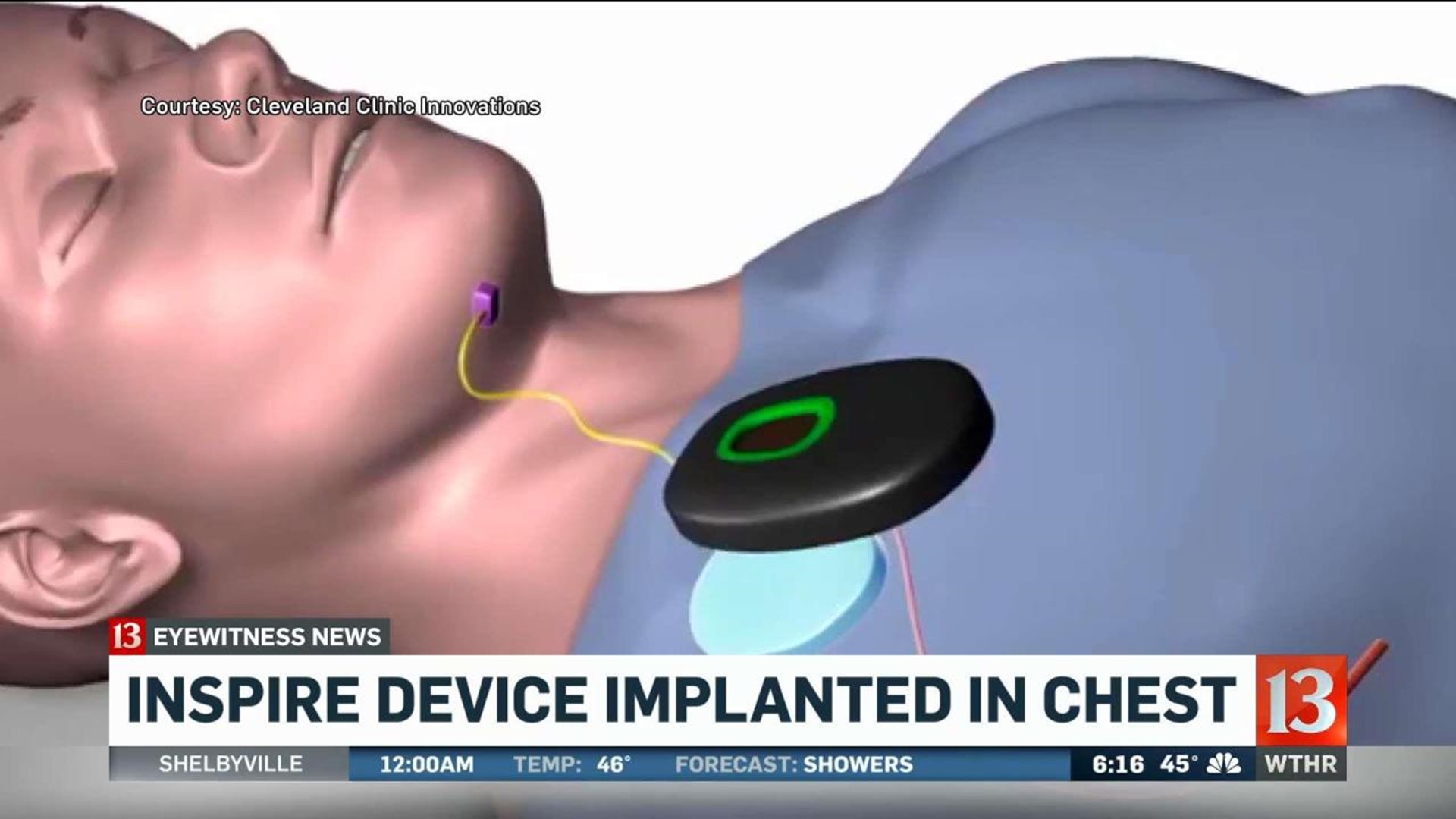INDIANAPOLIS (WTHR) — If you have trouble sleeping at night you are not alone.
The Centers for Disease Control and Prevention reports one-third of the population is not getting a good night sleep, and the impact on your heart health can be significant.
The gold standard treatment for patients diagnosed with sleep apnea is sleeping with a continuous positive airway pressure or CPAP machine.
But for patients seeking sleep, who have tried and failed with the CPAP machine, there is a new alternative, that clears the obstruction by moving your tongue forward as you sleep.
The Inspire pulse generator is implanted in your chest like a pacemaker. This FDA-approved therapy has two leads.
The first lead is placed in the chest to sense when a patient inhales. The second lead, is place in the tongue and as a patient breathes, uses a mild stimulation to nudge the tongue forward. That movement of the tongue, opens the airway, and clears the obstruction that causes poor sleep.
The concept is so novel, the Cleveland Clinic named the technology one of the Top 10 Medical Innovations for 2018.
Kathy Mitchell learned she had severe sleep apnea after her sleep study at IU Health Sleep Medicine.
"By the time you get up, you think, ‘Man, I haven't had any sleep in a long time. I'm tired,’" Mitchell said.
Her study revealed that while she slept, her oxygen levels would drop and cause consistent arousal. Mitchell’s restless sleep impacted her partner, too.
"I don't want to use the word that starts with ‘H,’ but it was bad. I mean, I wasn't getting any sleep," said Denny Royalty.
Mitchell tried the CPAP machine for nearly a year.
"When you put it on, you have got to make sure you have got a seal well. It would make that suction noise,” Mitchell told Eyewitness News. “I felt like part of my face was coming off, and then, I didn't feel any different when I got up in the morning.”
The hum of the CPAP machine was also disruptive to her partner's sleep.
"You feel air when she was blowing on me and that is the exhaust of what she is breathing, and I love her but... you know what I mean?" Royalty explained with a laugh.
That's when Mitchell decided to try Inspire.
"It stimulates your tongue, so your tongue moves out, almost like a lizard," Mitchell said.
That movement is activated with a remote. Before Mitchell heads to bed, she adds batteries to the remote and syncs it to the device.
"If you think about it, it is really elegant," said Dr. Shalini Manchanda at the IU Health Sleep Medicine clinic.
Mitchell is one the 17 patients who have had the device implanted at IU health and one of 2,500 worldwide.
"I had the honors ... of doing the first patient, and I was really scared myself because I thought I am going to hurt the patient when I turned on the device, but it doesn't hurt,” said Manchanda. “The patient says it feels funny that is all they say. They don't feel any pain."
Manchanda likes that she can sync the Inspire device and track patient's compliance and sleep.
Inspire’s maker says says results of its clinical trial show adherence rates of 6 to 7 hours of sleep for Inspire patients, nearly double the rate of CPAP.
"I think it's really… ground breaking,” Manchanda said. “I think it's been actually tremendous for our patients. It's really been exciting for us.”
"This to me has been a lifesaver. I'm able… I feel much better. I just feel better," said Mitchell.
Two qualify to use the Inspire device, patients must meet several requirements:
- Have moderate to severe sleep apnea
- Be at least 22 years old
- Have tried and failed at CPAP
- Recommended patients have a Body Mass Index (BMI) less than 32

